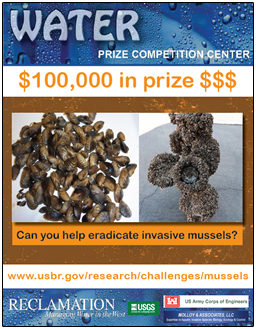(This story is from the Columbia
Basin Bulletin. Used with Permission).
 The Bureau of Reclamation received nearly 100
proposals from entities participating in an
agency challenge to develop new ways to stop the
proliferation of invasive mussel species. The Bureau of Reclamation received nearly 100
proposals from entities participating in an
agency challenge to develop new ways to stop the
proliferation of invasive mussel species.
The Bureau announced in December that it would
be seeking “innovative solutions for the 100
percent eradication of invasive quagga and zebra
mussels, lakes and rivers in a cost-effective
and environmentally sound manner.”
The challenge is actually a competition, with
applicants aiming for a $100,000 purse that will
be split among a maximum five winners.
Peter Soeth, a public affairs specialist with
the Bureau in Denver, reports that 99 solution
proposals were submitted by the Feb. 28
deadline.
“We will now review and rate those proposals to
see if any will qualify for the funding,” Soeth
said. “Once that is complete, we will announce
the winners.”
Invasive mussels have caused havoc in waters
where they have become established, rapidly
reproducing to a point where they infest hydro
and irrigation structures, along with shoreline
structures and watercraft.
“Invasive mussel infestations pose significant
logistical and economic challenges for local
communities, recreationists and water managers
by potentially disrupting water deliveries,
increasing facility maintenance costs and
impacting the local ecology,” the Bureau states
in a press release.
“Currently, no known broad-scale application for
open water exists to safely eradicate mussels in
an environmentally sound manner,” said David
Raff, science adviser for the Bureau.
Solutions may be novel treatments or approaches
that build upon existing treatments. They must
be specific to invasive mussels, “without harm
to non-target organisms such as native mussels
or threatened and endangered species. They must
be already in compliance with existing federal
discharge permits and environmental protection
regulations or must be implementable with
reasonable modifications to existing
regulations. Successful treatments must be
cost-effective and scalable to large water
bodies.”
Over the last decade, efforts to detect and
prevent invasive mussel species have quickly
grown to become an environmental priority in
Columbia Basin states that have mussel-free
waters. Boat inspections have become fairly
common on highways and at marinas and boat
launches, and public information campaigns have
been undertaken.
The inspections have detected dozens of
mussel-infested watercraft in transit from other
states where mussels are present.
The competition for the $100,000 prize is the
first of a three-part challenge. The solution
proposals were submitted as “white papers.” The
second stage will involve “proof-of-concept” in
a laboratory-scale demonstration. Stage three
will involve field-scale demonstrations.
The competition is also part of a series of
initiatives that were developed through a
collaboration of western governors, as well as
federal, state and tribal agencies. The
initiatives were highlighted by Interior
Secretary Ryan Zinke last June.
Reclamation is collaborating with the U.S.
Geological Survey, the U.S. Army Corps of
Engineers and Molloy and Associates.
More information on the mussel challenge can be
found at:
https://www.usbr.gov/research/challenges/mussels.html |

